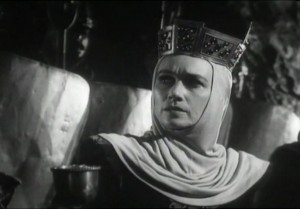Anti-Femininity: What Lady Macbeth can teach us about Feminism
Jeanette Nolan in Macbeth (1948)
“Come you spirits that tend on mortal thoughts, unsex me here,” vows Lady Macbeth as she prepares to convince her husband to murder the King of Scotland. It is a line and a scene that I have pondered for far too long, caught up in my attempt to reconcile her aggressive rejection of femininity with the powerful woman that my high school reading of Macbeth always made her out to be. Looking back, it bothers me that so many women, including myself, often succumb to equating Lady Macbeth with levels of temerity and impressiveness that they themselves wish they could attain. A woman who renounces her sex in attempt to gain power cannot be considered a feminist when it only kindles the belief that femininity has no place in a competitive man’s world. Still, I have no doubt that despite Macbeth being considered to be one of Shakespeare’s most misogynistic plays, many students continue to believe that Lady Macbeth is one of Shakespeare’s strongest characters.
If there is anything that a modern feminist reading of Lady Macbeth’s impending tragedy should teach us, it is that strength does not necessarily equate to masculinity and that masculinity does not necessarily equate to ruthlessness and aggression. Yet, I feel that one of the more dangerous consequences of our drive to eliminate the gender gap and to level the playing field is exactly that. While it is very rarely articulated, even this subconscious belief that we must defeminize ourselves in order to be taken seriously in both the feminist and the global community is troubling. What we are doing is moving from one generality to another, and this only reinforces the idea that women must construct a false persona if they are to be respected.
While the anti-femininity is probably rooted in the derision constantly hurled our way, it is possibly even more problematic that we have chosen to use it as a defense mechanism even when around other women. There is a lot of “I’m not like other girls because I [blank]” talk out there, and through this rather selfish proclamation, we only strengthen the idea that there can be only one stereotypical feminist. Conversations about childhood always bring out the shaming that is inherently tied to the idea of what comprises a modern, feminist woman. “I was never that girl that played with dolls or a kitchen set” is a sentiment I am quite tired of listening to. I agree that the manufacturers of toys geared towards young girls have created stereotyped image of what girls should or should not be playing with. However, it is important to remember that the issue lies with those who believe in the binary segregation of genders, not with the children who choose to create a unique space within the gender spectrum. Young Adult Author Claudia Gray articulates this issue perfectly in her blog post, “I’m not like other girls”:
“It saddens me to see girls proudly declaring they’re not like other girls – especially when it’s 41,000 girls saying it in a chorus, never recognizing the contradiction. It’s taking a form of contempt for women – even a hatred for women – and internalizing it by saying, Yes, those girls are awful, but I’m special, I’m not like that, instead of stepping back and saying, This is a lie.
The real meaning of “I’m not like the other girls” is, I think, “I’m not the media’s image of what girls should be.” Well, very, very few of us are. Pop culture wants to tell us that we’re all shallow, backstabbing, appearance-obsessed shopaholics without a thought in our heads beyond cute boys and cuter handbags. It’s a lie – a flat-out lie – and we need to recognize it and say so instead of accepting that judgment as true for other girls, but not for you.”
Perhaps it is this skewed and contradictory understanding of what makes a strong woman that allows people to put characters such as Lady Macbeth on pedestals. Even in modern fiction, there is a tendency to gravitate towards the female character with the more stereotypically male traits. We forget that strength does not necessarily mean force. We dismiss nuanced femininity in fear of not being taken seriously. The ultimate goal of feminism should be to create a space where everyone can exist on equal grounds irrespective of their level of femininity or masculinity. Deriding those who choose to dress or act in a way that can be considered feminine only abolishes the level playing field that we are trying to attain.
Blog Director Scr ’15

![[in]Visible Magazine](https://community.scrippscollege.edu/invisible/wp-content/uploads/sites/5/2011/04/Invisible-Masthead-2011-Spring1.png)









No comments yet... Be the first to leave a reply!